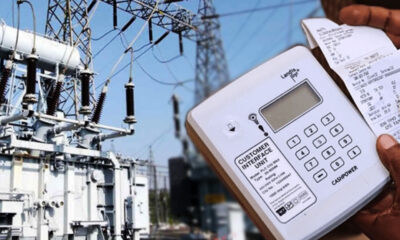Business
NERC presses DisCos to buy power directly from Gencos

NERC presses DisCos to buy power directly from Gencos
The Nigerian Electricity Regulatory Commission’s (NERC) recent directive for Distribution Companies (DisCos) to transition away from the single-buyer model contract with energy generation companies (GenCos) has sparked significant controversies in the power sector.
This shift has raised questions about the contract breach and the potential disruptions it may cause within the sector, with implications that could ultimately affect end-user customers.
The order which was introduced in July by the regulatory body is part of the unbundling of the electricity value chain, the Nigeria Electricity Supply Industry, also known as NESI.
Under the new directive, DisCos are now required to establish direct contracts with power Generation Companies GenCos, bypassing the government-owned Nigerian Bulk Electricity Trading Company (NBET).
Although this initiative appears to be a straightforward solution to streamline contract agreements within the power value chain, officials from the DisCos who spoke to Nairametrics believe the issue is far more complex.
Contract Obligations with the FG to be taken up by DisCos
With the elimination of the Nigerian Bulk Electricity Trading (NBET), the Distribution Companies (DisCos) are now expected to take on the responsibility of fulfilling certain contracts originally initiated by the federal government with generating companies.
A source who spoke to Nairametrics revealed that the DisCos will now bear the burden of certain contracts that gas companies had entered into with the federal government. These contracts must be fulfilled by the DisCos, even if there are other available options, the source said.
The source said, for instance, the federal government’s obligatory contract with the Azura power plant will have to be continued by DisCos, which is relatively more expensive than other gas and hydro companies.
READ ALSO:
- Nigeria telecom sector in intensive care unit, says MTN
- Edo gov poll: Igbinedion’s daughter dumps PDP
- JUST IN: 16 feared dead, 17 injured in Ibadan multiple accidents
“Azura has a more specific guarantee with the federal government. With its 437 MW capacity, DisCos will have to fulfil the contract with the company, even before turning to other alternatives,” the source told Nairametrics.
Minimum Power Outage Requirements
In the new bilateral power arrangement, Discos will also prioritize purchasing power from GenCos based on a structured approach that begins with their minimum power uptake requirements.
For instance, power generated by hydroelectric plants, which typically offer the most cost-effective electricity, will be the first choice for DisCos.
However, to prevent any single DisCo from monopolizing this affordable resource, each Disco will only be permitted to purchase a proportionate share of the hydroelectric power, corresponding to their grid allocation.
“For example, if a DisCo is responsible for 10% of the total power consumption from the grid, it will only be allowed to purchase 10% of the available hydroelectric capacity, which stands at around 1,500MW,” a top official from a DisCO informed Nairametrics.
This rigid structure might distort the market by limiting Discos’ ability to negotiate better deals or pursue more competitive power sources.
This could reduce operational flexibility and create financial risks for Gencos that are less utilized, such as those with higher costs.
“If you pay close attention to what the federal government, that is, NERC is saying, you’d realize that they’re saying they don’t want to pay for any form of electricity subsidy anymore with this new arrangement,” an official from Ikeja Electricity, speaking on condition of anonymity, told Nairametrics.
Infrastructural Challenges
In addition, the new arrangement could also result in infrastructure challenges, as the existing transmission and distribution systems may struggle to handle the varying power sources efficiently, leading to inefficiencies or power losses.
“This is the most important one if you ask me,” said a source.
“The issue isn’t just about power generation, but whether the grid has the capacity to handle an increased power output. Without significant investment in expanding substations nationwide, the entire system risks collapsing if the Distribution Companies (DisCos) receive more power than the grid can support,” the source said.
Phasing Out of Electricity Subsidy
The gradual elimination of NBET, a government-owned trading company, means the DisCos move to a “take-or-pay” contract, directly dealing with the gas companies.
By “take-or-pay” contract, NERC means the payment for gas will now be cost-reflective with little or no government assistance in balancing the receipt of either party.
READ ALSO:
- Ekiti: Four sentenced to life imprisonment for kidnapping
- Money laundering has reduced in West Africa, says GIABA
- Troops kill five terrorists, 44 surrender in Borno
“This is why it is a bilateral agreement. It’s between the two parties only.
“It is near matured because the market is still being supported by FG subsidy and other PSRP funding support which the market will be waned off from time to time,” Babajide Akintoye, an official in Eko DisCo told Nairametrics.
For Akintoye, such a free-market, cost-reflective contract would mean the federal government doesn’t have to step in to cover the loss of DisCos, which currently struggles with operational losses as well as inadequate revenues.
“Ordinarily, this arrangement wouldn’t have been a concern for the Discos in view of the subsidy portion of Disco revenues that the FG intends to provide to partially support monthly invoices issued to Discos from GENCOS with activated PPAs.
“But with the government finding ways to reduce its current electricity subsidies, this new agreement means whether DisCos current escrowed revenues will be sufficient to pay the invoices issued under proposed bilateral arrangements,” he added.
Electricity Subsidy no Longer Sustainable
Indeed, the government still has a huge influence in the power sector paying a huge bailout of subsidy to DisCos to help cover operational loss and poor billing of customers.
According to recent data from the new tariff plan for the eleven DisCos across the country, the federal government is projected to provide N1.7 trillion in electricity subsidies to the DisCos in 2024.
However, the Minister of Power, Adebayo Adelabu, has consistently stressed that this level of government subsidy is unsustainable.
He has advocated for the sector to transition from a subsidy-driven model to a more cost-reflective approach.
“What most people fail to realize is that while DisCos are responsible for the collection of electricity tariff, a huge bulk of it still goes to the GenCos and TCN. Only about 20% of all tariff collected is given to DisCos to run its operations.
“Another misconception is that we set tariffs, which we don’t. People easily blame us for an increase in their tariff because we’re the ones they see. But it’s the federal government that sets the tariff,” a top official in Abuja DisCo said.
“With this new order, DisCos will have to depend on its own meagre revenue and loans from banks to fund its own contract with the gas companies,” Olumide Jerome, another official from Abuja DisCo said.
More Customers to pay more for Electricity
The federal government has already excluded about 15% of electricity end-user customers from any form of subsidy.
These end-users, dubbed Band A customers, now pay a cost-reflective tariff on their electricity, paying N206.80/kWh from the N66/kWh, a more than 250% increase in tariff.
According to NERC, the federal government would have budgeted about N3.2 trillion to subsidise electricity in 2024 without a tariff hike.
But this is not the end of the increase in tariffs for customers. The goal is to extend the tariff to more and more customers who the federal government believes need to pay their fair share of electricity usage.
“I think both NERC and federal government are putting the cart before the horse. You see, most of the people under Band A and even most of the customers do not have a meter.
“How then do the government determine what they consume? They use an estimated billing model which is not always reflective.
“What I think the government should do is to meet the metering gap first then unbundle NBET. You can’t ask DisCos to get power from say Zungeru power plant without any assistance from the government and not expect them to increase tariffs or their revenue collections.
“It simply means you want people to pay more. I’m not just talking about Band A customers, but everyone will eventually start paying more if the DisCos have to balance their books,” energy expert, Oni said.
NERC presses DisCos to buy power directly from Gencos
nairametrics
Entertainment
NRC, Entertainers Finalise Plans for 2026 Valentine Train Ride

NRC, Entertainers Finalise Plans for 2026 Valentine Train Ride
A team of leading Nigerian artistes and entertainment executives has paid a courtesy visit to the Managing Director of the Nigerian Railway Corporation (NRC), Kayode Opeifa, ahead of the 2026 Valentine Love Train experience.
The delegation included celebrated musician Sunny Neji, Managing Director of Ojez Entertainment Limited, Joseph Odobeatu, and veteran vocalist Yinka Davies.
The high-profile visit formed part of final preparations for the Valentine-themed train ride scheduled for Saturday, February 14, 2026, at the Mobolaji Johnson Train Station.
Dr. Opeifa received the artistes and commended the creative industry for choosing the national rail system as the venue for the annual Valentine event. He noted that the partnership reflects growing public confidence in the corporation’s safety standards, operational improvements, and renewed focus on customer experience.
READ ALSO:
- 2027 General Elections: INEC Announces February 20 for Presidential Poll
- EFCC Nabs Three in Borno Over Viral ₦500 Naira Mutilation Video
- Omokri Accuses El-Rufai of Rights Abuses During Kaduna Governorship
“The 2026 edition aims to deliver an unforgettable experience while deepening public engagement with the rail service,” Opeifa said, reaffirming the NRC’s commitment to providing secure and efficient transport for passengers during special events.
Organisers disclosed that this year’s edition will feature an expanded entertainment lineup, including performances and appearances by Charles Inojie, Yinka Davies, Sunny Neji, and Segun Arinze. Guests are expected to enjoy live music, comedy, a couple’s game show, fashion showcases, and special performances throughout the Lagos–Ibadan–Lagos train ride, culminating in a Valentine banquet ball.
The Valentine Love Train has in recent years become a fixture on the NRC’s festive calendar, attracting couples, families, and leisure seekers with its blend of travel, romance, and entertainment. The initiative also aligns with ongoing efforts by the corporation to promote rail transportation as a viable and enjoyable alternative for intercity travel.
With final logistics being fine-tuned, organisers say the 2026 edition promises to combine safety, comfort, and premium entertainment for participants.
NRC, Entertainers Finalise Plans for 2026 Valentine Train Ride
Auto
Lagos Motor Fair, Autoparts Expo to begin March 17, targeting Investment, Industry Growth

Lagos Motor Fair, Autoparts Expo to begin March 17, targeting Investment, Industry Growth
The 20th edition of the Lagos International Motor Fair and the 13th Africa Autoparts Expo is set to spotlight investment, technology transfer and industry collaboration as organisers intensify efforts to position Nigeria as a major automotive hub in West Africa.
The three-day event, which will also incorporate the Africa Motorcycle and Tricycle Expo, is scheduled to hold from March 17 to 19, 2026, at the Federal Palace Hotel in Lagos.
Organisers said the upcoming edition would focus strongly on accelerating the development of the country’s automotive sector by creating platforms that connect global manufacturers with local industry players.
“Nigeria has all it takes to become a global automotive industry giant,” the organisers stated, noting that the fair remains a strategic contribution toward driving growth despite prevailing industry challenges.
Chairman of the Organising Committee, Ifeanyichukwu Agwu, said the exhibitions had over the years evolved into a key platform for attracting investment into automobile spare parts and accessories manufacturing while strengthening aftermarket activities across the region.
“We have consistently used these events to attract investment into auto components manufacturing and to showcase the enormous capacity and potential of this critical sector of the economy,” he said.
READ ALSO:
- First Daughter of Murtala Muhammed Reflects on Life Without Father, Preserving His Legacy
- Anambra Police Arrest Motel Owner, Two Others Over Firearms, Drug Trafficking
- 2 Nigerians Killed While Fighting for Russian Army in Ukraine War
Agwu, who also serves as Managing Director of BKG Exhibitions Limited, disclosed that the 2026 edition would place emphasis on business-to-business engagement between original equipment manufacturers (OEMs) and auto parts dealers from Nigeria and neighbouring countries.
According to him, the goal is to foster partnerships capable of leading to the establishment of component manufacturing plants locally.
He added that the exhibition is expected to support government policies aimed at building a sustainable automotive industry by stimulating the emergence of companies involved in component production.
Calling for policy adjustments, Agwu urged the Federal Government to prioritise spare parts and components manufacturing over vehicle assembly, arguing that deeper technology transfer and innovation occur within the components segment.
“Spare parts manufacturing is where real technology transfer occurs. It involves precision engineering, planning and innovation—far beyond the coupling processes involved in assembly,” he said, while also advocating a review of the existing automotive policy to better support local production.
Despite the challenges associated with hosting large-scale industry events, Agwu reaffirmed the organisers’ commitment to sustaining the platform, warning that neglecting the automotive sector could have far-reaching consequences for the economy and employment.
The organisers said more than 100 original components manufacturers from countries including China, India, South Korea, South Africa, Singapore and Turkey, alongside major automobile distribution and manufacturing companies operating in Nigeria, are expected to participate.
In addition to product exhibitions, the event will feature seminars and technical workshops focusing on policy, investment opportunities, technology transfer and industry best practices, with each day structured to deliver value to exhibitors, investors, policymakers and other stakeholders.

Lagos Motor Fair, Autoparts Expo to begin March 17, targeting Investment, Industry Growth
Business
Naira Could Trade Below ₦1,000/$ With Dangote Refinery at Full Capacity — Otedola

Naira Could Trade Below ₦1,000/$ With Dangote Refinery at Full Capacity — Otedola
Billionaire businessman Femi Otedola has projected that the naira could strengthen to trade below ₦1,000 per US dollar as the Dangote Petroleum Refinery achieves full operational capacity. The prediction comes as Nigeria anticipates a major boost in domestic fuel production, potentially reducing import dependence and easing pressure on the foreign exchange market.
Otedola made the projection in a post on X, congratulating Aliko Dangote on the refinery reaching its designed processing capacity of 650,000 barrels per day (bpd). He described the milestone as a historic moment for Nigeria’s energy sector, saying it could positively impact the naira exchange rate, foreign reserves, and overall economic stability.
According to Otedola, the refinery’s capacity to produce up to 75 million litres of Premium Motor Spirit (PMS) daily positions Nigeria to meet domestic fuel demand and even generate surplus for export. He highlighted that this would reduce the country’s reliance on imported petroleum products, which historically exerted heavy pressure on the naira and foreign exchange resources.
READ ALSO:
- Adeyanju Urges EFCC, DSS to Probe El-Rufai Over Alleged Corruption, Insecurity in Kaduna
- Granite-Laden Truck Kills Motorist, Leaves Wife Critically Injured in Lekki–Ajah Crash
- City Boy Movement Receives Bus Donations from Zenco, Obi Cubana for Tinubu’s Campaign
“With domestic refining now firmly underway after decades of reliance on imports, pressure on the foreign exchange market should ease significantly, potentially pushing the naira below ₦1,000/$ before year-end,” Otedola said. He also noted that the EFCC and monetary authorities’ support in maintaining a conducive economic environment would complement these gains.
The Dangote Refinery, located in the Lekki Free Zone, Lagos, is Africa’s largest single-train refinery. Experts say that reaching full production will conserve billions of dollars previously spent on importing refined petroleum products and strengthen Nigeria’s foreign exchange reserves. Plans are also underway to expand refining capacity to 1.4 million bpd, with increased production of petrochemicals like polypropylene and linear alkyl benzene, further reducing industrial import dependence.
Economic analysts have welcomed the refinery’s milestone but caution that naira stability will still depend on broader macroeconomic reforms, oil prices, foreign capital inflows, and Central Bank of Nigeria (CBN) policies. Nevertheless, Otedola’s projection reflects renewed optimism that domestic refining capacity could be a turning point for the Nigerian economy, energy security, and the foreign exchange market.
Naira Could Trade Below ₦1,000/$ With Dangote Refinery at Full Capacity — Otedola
-

 metro3 days ago
metro3 days agoIKEDC Sets Feb 20 Deadline for Customers to Submit Valid IDs or Face Disconnection
-

 Education3 days ago
Education3 days agoSupreme Court Affirms Muslim Students’ Right to Worship at Rivers State University
-

 metro2 days ago
metro2 days agoLagos Police Launch Manhunt for Suspect in Brutal Ajah Murder
-

 News2 days ago
News2 days agoAso Rock Goes Solar as Tinubu Orders National Grid Disconnection
-

 Business3 days ago
Business3 days agoNaira Could Trade Below ₦1,000/$ With Dangote Refinery at Full Capacity — Otedola
-

 Politics3 days ago
Politics3 days agoCity Boy Movement Receives Bus Donations from Zenco, Obi Cubana for Tinubu’s Campaign
-

 metro3 days ago
metro3 days agoArmy University Professor Dies in Boko Haram Captivity After Nearly One Year
-

 International3 days ago
International3 days agoTrump Halts Minnesota Immigration Crackdown After Fatal Shootings, Protests













